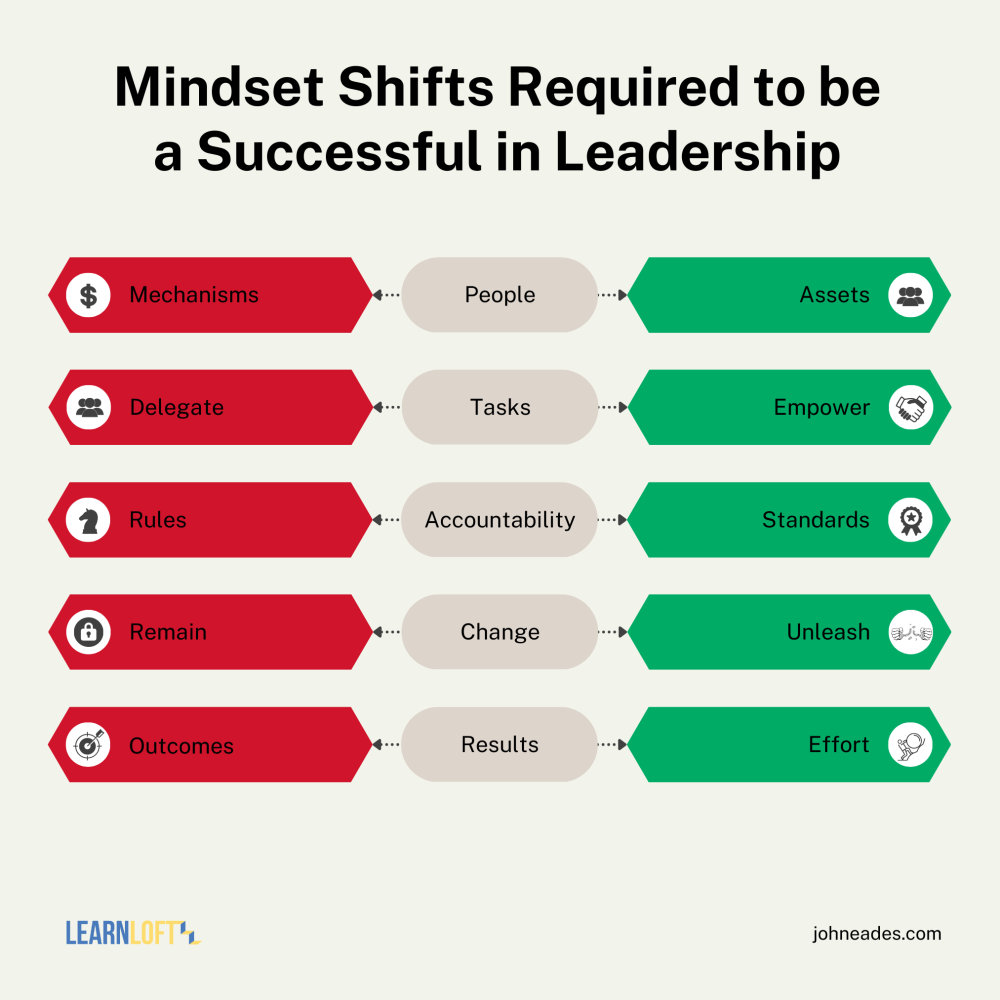Comments
- No comments found

If you only make one mindset shift as a leader, change from thinking about people as a mechanism to an asset.
We all make shifts in our life, both personally and professionally. Sometimes it's a giant leap in a new direction, other times, it's a small one. The hard part isn't considering a shift. It's following through on the actions after deciding it's the path to go down.
The truth is that every leader needs to change. Some changes are just more drastic than others.
Every leader needs to make shifts.
We are creatures of habit, so changing our mindset or behaviors isn't easy. However, we aren't born great at the ability to change or shift. It is something that is learned and practiced.
When you have a change to make, the secret is to consult your future self. Imagine yourself ten or twenty years from now, looking back at that catalyst decision point, and respect what your future self is telling you to do.
I don't know exactly where you are in your leadership journey, but it's a great time to evaluate what changes you need to make to be a more effective and successful leader. To be the kind of leader I described in Building the Best, one whose actions inspire, empower, and serve in order to elevate others.
Based on years of research, coaching, and experience, here are the five mindset shifts required to be successful in leadership.

The temptation has always been there to think of people as mechanisms to get work done. While it was never ok, the assembly line economy made it a more straightforward mindset to possess. Unfortunately, too many organizations and their leaders continue to treat their people this way.
Shifting your mindset from employees as mechanisms to assets all about developing a culture that cares. If you are looking for great examples, look at companies like Lippert Components and Movement Mortgage.
Employees aren't mechanisms to get work done. Instead, they are assets to invest in so they can do their best work.
Think of it this way. Employees aren't mechanisms to get work done on a task list like a robot, but to invest in them so they can do their best work and become the best version of themselves both at work and home. Companies and teams thrive and innovate when people do their best work.
A common piece of advice from management experts is, "Managers must delegate more." While the suggestion of taking things off your plate and putting them on someone else's makes sense on the surface, it couldn't be more wrong when it comes to leadership advice. The reason is that managers delegate; leaders empower.
Managers delegate; leaders empower.
From a management perspective, delegation occurs when managers assign their employees specific tasks. From a leadership perspective, empowerment enables others to be responsible for and take ownership of something. Here are some ideas for how to empower instead of delegate.
Accountability is a critical element of leadership. Without accountability, teams always fall short of their potential. However, most leaders get accountability wrong. They assume they are good at accountability because they are willing to fire someone or enforce a set of rules.
Shared standards and accountability allows teams to reach their full potential.
In his new Masterclass, Hall of Fame Duke Basketball coach Mike said, "In developing teams, I don't believe in rules. I believe in standards. Rules don't promote teamwork, standards do. Rules are issued by a leader to a group. When something is presented as a rule, you can't own it. You can't live it. Standards, on the other hand, are lived. This is what we do all the time. These are the things for which we hold one another accountable."
What Coach K gets right is that standards promote ownership and shared accountability among team members. Take a page from Coach K and shift your mindset from rules to standards.
Change is a fundamental part of life and business. The only thing constant is change, which is why leaders must embrace it.
Take the University of Georgia head football coach Kirby Smart as an example to demonstrate how powerful this is as a leadership mindset. Just moments after winning his second consecutive National Championship convincingly over TCU 62-7, he was asked what it would take to win three in a row. His answer was a masterclass in leadership and embracing change:
In order to win again, we're going to have to reinvent ourselves next year because you can't just stay the same. - Kirby Smart
Imagine the pinnacle moment of your career. Would you think about the change that needs to be unleashed tomorrow or what needs to remain the same? There is a good chance your answer would be what needs to remain the same because what helped you achieve success was proven to work. But the best leaders always look to unleash change because they know it's required.
Winning matters, and it always will. Positive outcomes build self-confidence, create opportunities, and put food on the table. When someone tells you winning doesn't matter, you are looking at a loser. However, when leaders have the mindset of solely being outcome focused, they make an enormous mistake.
The best leaders know to achieve positive outcomes; they must focus on the right effort, standards, processes, and systems that create the results.
To achieve positive outcomes sustainably, you must focus on the correct effort that creates the results.
This shift can be highly challenging for many managers because they are ultimately measured by their team's short-term results.
Making shifts or changes is challenging because of the actions required after the decision. I hope you will pick one shift that would benefit you or your team and take action to make it a reality.
John is the CEO of LearnLoft, author of, F.M.L. Standing Out & Being a Leader and host of the 'Follow My Lead' Podcast. He writes or has been featured on Inc.com, LinkedIn Pulse, TrainingIndustry.com, eLearningIndustry.com, CNBC Money, and more. John completed his education at the University of Maryland College.
Leave your comments
Post comment as a guest